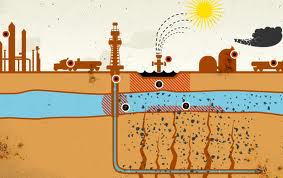Hydraulic fracturing, or ‘fracking,’ is a process by which high-pressure injections of water, sand and chemicals are used to blast through rock to release oil and gas trapped inside.
The study found that ‘surface spills of of fracturing fluids pose greater risks to groundwater sources than from hydraulic fracturing itself,’ and described those problems as common to other forms of oil and gas development as well.
Environmental contamination from operations to remove gas from deep within the Earth, known as hydraulic fracturing, often happens close to surface and not far below, according to a U.S. study.
Spills at the drill site or problems with cement casing around upper well bores were examples of incidents that have led to shallow groundwater contamination in the United States, according to a research by the University of Texas.
“Most of what we have seen happening related to shale gas development that impacts the environment was at or near the surface,” said project leader Charles “Chip” Groat, presenting the findings at a major science conference in Vancouver.
“We found no direct evidence that hydraulic fracturing itself, the practice of fracturing the rocks, had contaminated shallow groundwater,” he added.
Groat said the review of fracking operations in Texas, Louisiana, and Marcellus Shale area throughout the northeastern United States was funded by the university and that the team had turned down industry funds.
The report, called ‘Fact-based Regulation for Environmental Protection in Shale Gas Development,’ aimed to ‘separate fact from fiction’ and give policy makers a tool going forward as the US experiences a major natural gas boom, Groat said.
However, he admitted that the amount of actual science out there to measure the reports of tap water that can be lit on fire, earthquakes resulting from fracking and potentially damaging methane emissions, is thin.
The study found that ‘surface spills of of fracturing fluids pose greater risks to groundwater sources than from hydraulic fracturing itself,’ and described those problems as common to other forms of oil and gas development as well.
Questions about gas in drinking water and methane emissions will be examined ‘more intensely in the months ahead’ as more research becomes available, Groat added.
It did not call for a strict new regulatory framework but said individual states could take steps to supplement the regulations already in place.
